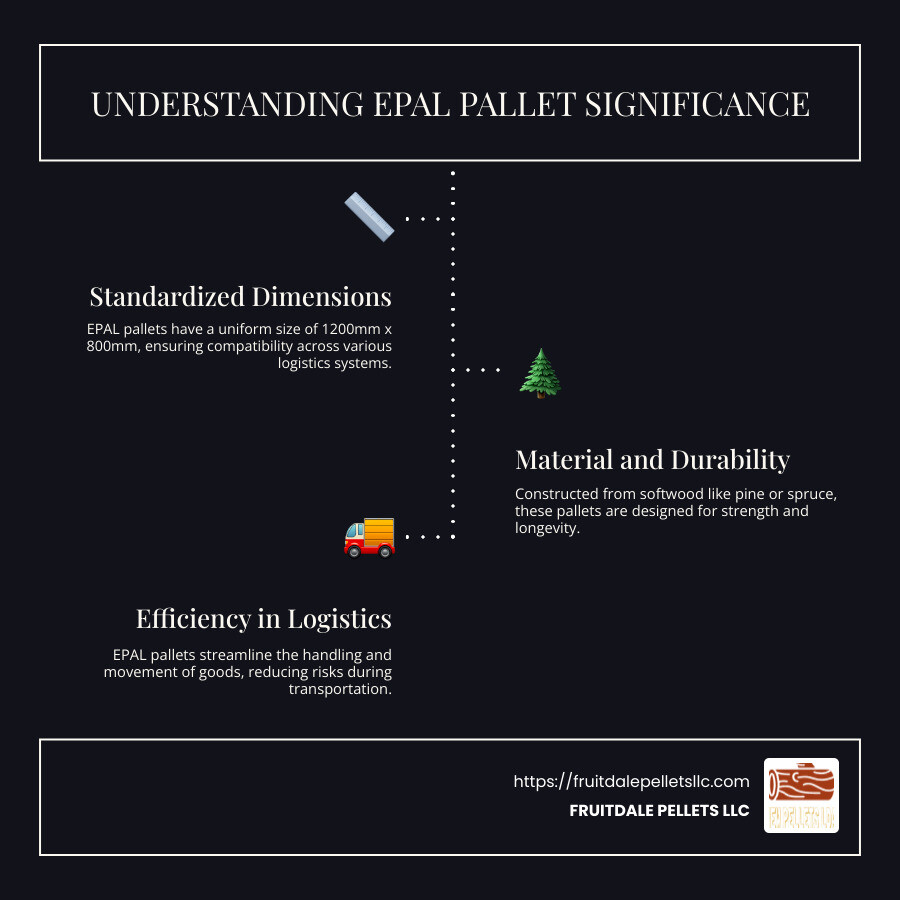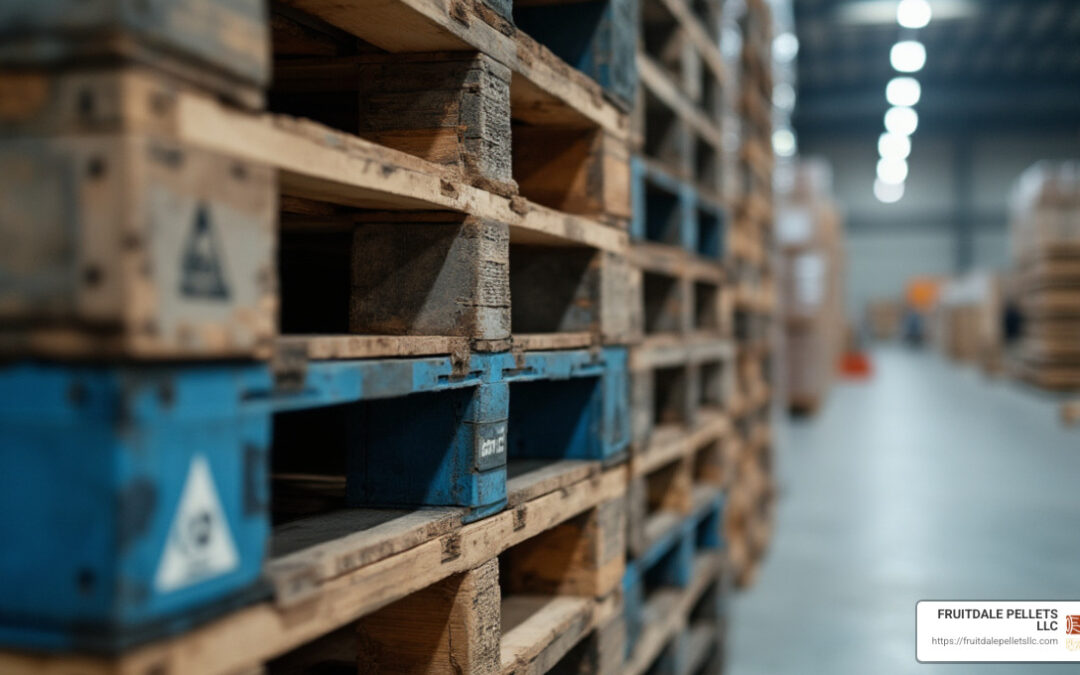EPAL pallet meaning is crucial to understanding modern logistics. These standard-sized wooden platforms are indispensable in the transport and storage industries. They are regulated by the European Pallet Association (EPAL) to ensure uniformity and high quality.
- EPAL: European Pallet Association
- Size: 1200mm x 800mm x 144mm
- Material: Softwood like pine or spruce
- Importance: Efficiency and safe handling in logistics
In logistics, the innovation of EPAL pallets has been revolutionary. Originally developed in the 1950s by European countries, EPAL pallets have become essential, changing how goods are handled and moved. They are known for their standard size, making them compatible with various modes of transportation and storage systems. This standardization brings about greater efficiency and safety, crucial elements in logistics worldwide.
These pallets are everywhere today, woven into the fabric of global trade. They support heavy loads, are easy to move, and reduce risks during shipment. They help create a more streamlined and organized logistics process, which is essential for companies looking to remain competitive in international markets. Understanding EPAL pallets and their role in logistics is key for managing supply chains effectively.

Epal pallet meaning helpful reading:
What is EPAL?
The European Pallet Association (EPAL) is the organization behind the standardized pallets that are crucial to logistics and supply chains across Europe and beyond. Established in 1991, EPAL oversees the production and repair of these pallets to ensure they meet strict quality and safety standards.
EPAL Pallets
EPAL pallets, commonly referred to as Euro pallets, are the backbone of efficient logistics. They are known for their standard dimensions—1200mm x 800mm x 144mm—which make them ideal for use in various transport and storage systems. This consistency allows for seamless integration into high rack systems, trucks, and warehouses.
EPAL pallets are typically made from softwood, such as pine or spruce, which provides a balance of strength and weight. This ensures they are not only durable but also easy to handle.
Pallet Dimensions
The standardized dimensions of EPAL pallets are a key feature that facilitates their widespread use. The uniform size enables businesses to optimize space in transport vehicles and storage facilities. This standardization also simplifies the logistics process, reducing the complexity that can arise from using pallets of different sizes.
By maintaining these dimensions, EPAL pallets help streamline operations, making them an integral part of supply chains worldwide. Whether you’re moving goods within Europe or exporting to other continents, EPAL pallets offer a reliable and efficient solution.
EPAL Pallet Meaning and Specifications
Understanding the EPAL pallet meaning is essential for anyone involved in logistics and supply chains. EPAL pallets, also known as Euro pallets, are standardized load carriers managed by the European Pallet Association. They are designed to improve efficiency and safety in handling, storing, and transporting goods.
Dimensions and Materials
EPAL pallets have standard dimensions of 1200mm in length, 800mm in width, and 144mm in height. These measurements are carefully maintained to ensure compatibility with various transport systems and storage facilities across Europe and the world.
The construction of EPAL pallets involves the use of softwood, primarily pine or spruce. This choice of material strikes a balance between strength and weight, making the pallets robust yet easy to handle. To improve durability and safety, EPAL pallets undergo heat treatment. This process sterilizes the wood, eliminating pests and ensuring compliance with international shipping standards.

Load Capacity and Weight Limits
EPAL pallets are engineered to handle significant loads, with specific guidelines for dynamic and static load capacities. The dynamic load capacity refers to the maximum weight a pallet can support while being moved, such as by a forklift. For EPAL pallets, this capacity is up to 1,500 kg.
In contrast, the static load capacity defines the weight a pallet can bear when stationary. EPAL pallets can support up to 4,000 kg when not in motion. This distinction between dynamic and static loads is crucial for ensuring the safe and efficient handling of goods.
Weight distribution is another vital consideration. Properly distributing weight across the pallet’s surface helps maintain stability and prevents damage during transport. EPAL pallets are designed with this in mind, providing a reliable foundation for a wide range of products.
By adhering to these specifications, EPAL pallets ensure consistent performance and safety, making them an indispensable component in global logistics networks.
Quality Control and Certification
When it comes to ensuring the quality and reliability of pallets, the EPAL certification process is rigorous and thorough. This process is designed to uphold the highest standards in the production and maintenance of EPAL pallets, ensuring they meet the needs of logistics and supply chain operations around the world.
EPAL Certification Process
To achieve EPAL certification, manufacturers must undergo a comprehensive process that includes several key steps:
- Compliance with EPAL Standards: Manufacturers must first ensure that their pallets meet EPAL’s strict standards for dimensions, materials, and construction.
- Application and Audit: Once compliance is confirmed, manufacturers apply for certification and undergo an audit. This audit is conducted by EPAL to verify that the quality requirements are being met.
- License and Membership: After passing the audit, manufacturers are granted a license, allowing them to produce and sell EPAL pallets. This license is a testament to their commitment to quality and compliance.
- Regular Inspections and Audits: EPAL conducts ongoing inspections to ensure that manufacturers continue to adhere to the standards. This continuous oversight helps maintain the high quality of EPAL pallets in the market.
Identification and Markings
EPAL pallets are easily recognizable thanks to their distinct identification markings. These markings ensure authenticity and compliance with EPAL standards. Here’s what to look for:
- EPAL Logo: The EPAL logo is stamped on the side of each pallet, signifying that it meets the association’s standards.
- Unique Code: Each pallet has a unique identification code, which helps trace its origin and ensures its authenticity.
- IPPC Marking: This indicates that the pallet has undergone heat treatment, complying with international phytosanitary standards to prevent the spread of pests.
- Country Code and Quality Mark: These additional markings provide information about where the pallet was manufactured and confirm its adherence to quality standards.
By looking for these markings, customers can be confident that they are using genuine EPAL pallets, which are known for their durability and reliability in various industries. The ongoing commitment to quality control and certification makes EPAL pallets a trusted choice in logistics and transportation.
Advantages of EPAL Pallets
EPAL pallets are a powerhouse in logistics and supply chains, offering efficiency, sustainability, and versatility. These qualities make them indispensable across various industries.
Applicability in Various Industries
EPAL pallets are designed with compatibility in mind. Their standard dimensions and robust construction make them a perfect fit for a wide range of handling systems. This means they can easily integrate into existing logistics and transportation setups, reducing the need for multiple pallet types.
- Logistics and Transportation: The uniform size of EPAL pallets ensures they are easy to load, stack, and transport. This compatibility with forklifts and racking systems streamlines operations, saving time and reducing costs.
- Versatility Across Sectors: From food and beverages to industrial equipment, EPAL pallets can handle it all. Their ability to support various products makes them a versatile choice for businesses looking to simplify their operations.
Sustainability and Recycling Initiatives
EPAL pallets shine in their commitment to sustainability. They are crafted from recyclable materials, primarily softwood, which helps reduce environmental impact. Their design focuses on durability, meaning they last longer and generate less waste than disposable alternatives.
- Repair and Reuse: One of the standout features of EPAL pallets is their ability to be repaired. Instead of discarding damaged pallets, they can be fixed at authorized facilities, maintaining quality and extending their lifespan. This approach not only saves resources but also supports a circular economy.
- Recycling: When an EPAL pallet reaches the end of its life and can no longer be repaired, it is recycled responsibly. EPAL promotes environmentally-friendly recycling practices to ensure minimal waste.

These initiatives make EPAL pallets a leader in sustainable logistics, aligning with the growing global focus on environmental responsibility. Their recyclable materials, repairability, and efficient design make them an eco-friendly choice for businesses committed to reducing their carbon footprint.
Frequently Asked Questions about EPAL Pallets
How many Euro pallets is a full truckload?
When it comes to transporting goods, knowing the capacity of a truck is crucial. A standard full truckload can fit 33 Euro pallets. This number might change a bit depending on the truck’s size and capacity. But generally, 33 is the magic number for most logistics operations.
Using EPAL pallets ensures that loading and unloading are efficient and consistent. Their standardized dimensions make stacking straightforward, optimizing space and reducing transportation costs.
How long do EPAL pallets last?
EPAL pallets are known for their durability. With proper care, they can last ten years or more. This longevity is due to their robust construction and the quality materials used, primarily softwood like pine or spruce.
Regular maintenance, such as repairing minor damages and ensuring they are stored properly, can further extend their lifespan. The ability to repair and reuse these pallets also contributes to their long-lasting nature, making them a cost-effective solution for businesses.
Are EPAL pallets waterproof?
EPAL pallets are not inherently waterproof. Being made of wood, they can absorb moisture, which might affect their durability over time. However, you can improve their moisture resistance by applying waterproofing agents or sealants.
While these treatments can help, they won’t make the pallets completely waterproof. Proper storage in dry environments and handling can prevent moisture-related issues, ensuring the pallets remain in good condition for longer periods.
Conclusion
At Fruitdale Pellets LLC, we pride ourselves on supplying high-quality wood products, including EPAL pallets, which are recognized worldwide for their reliability and performance. Our commitment to quality is reflected in our adherence to the rigorous standards set by the European Pallet Association. This ensures that our products not only meet but exceed the expectations of our customers across various industries.
EPAL pallets are more than just a tool for transportation—they are a testament to the value of standardized quality and sustainability. With their consistent dimensions and robust build, these pallets simplify logistics and improve efficiency, making them an indispensable asset in supply chains.
We understand the importance of delivering internationally certified products, and our EPAL pallets are a prime example of this commitment. By choosing our certified products, businesses can trust that they are investing in durable, versatile, and environmentally friendly solutions.
Explore our range of EPAL pallets and find how they can streamline your operations and contribute to a more sustainable future. At Fruitdale Pellets LLC, we are dedicated to providing you with the best in wood products, custom to your needs and delivered with excellence.


